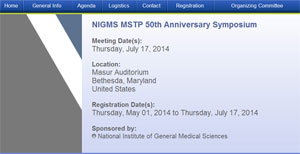Search Committee Members:
Howard Garrison, Federation of American Societies for Experimental Biology
Gary Gibbons, National Heart, Lung, and Blood Institute, Co-chair
Carlos Gutierrez, California State University, Los Angeles
Catherine Lewis, National Institute of General Medical Sciences, Co-chair
Hannah Valantine, Office of the Director, NIH
Dorit Zuk, National Center for Advancing Translational Sciences
NIGMS plays a major role in supporting research training, career development, diversity and capacity-building activities that foster a strong and diverse research workforce. The Institute’s Division of Training, Workforce Development, and Diversity (TWD) coordinates these efforts. TWD also serves as a focal point for similar activities across NIH and among other federal and non-federal agencies and organizations.
The search is now open for an outstanding individual to serve as director of the TWD Division. This position offers important and unique opportunities to set new directions and shape new strategies, including optimizing training models to best address scientific and workforce needs.
Candidates must have an M.D., Ph.D. or equivalent degree in a field relevant to the position. The ideal candidate will have a broad spectrum of scientific knowledge in fields related to the NIGMS mission and considerable experience in research, research training and activities aimed at developing a diverse biomedical and behavioral research workforce. Beyond that, we’re looking for someone who has vision, is innovative, and has exceptional leadership, management, strategic and collaborative skills; experience leading change; and an interest in testing ideas and approaches experimentally.
For additional information and application instructions, please see the vacancy announcement (no longer available). Applications will be accepted from June 1, 2014, to July 15, 2014.
As chair of the search committee for the division’s director, I ask for your help in identifying candidates for this crucial position and in sharing this information with others who might be interested.
UPDATE: This vacancy listing has been extended to August 31, 2014.

 This year is the 50th anniversary of the NIGMS Medical Scientist Training Program (MSTP), which supports research training leading to the combined M.D.-Ph.D. (or other dual) degree. Starting with only three institutions and a handful of supported students, the program has grown to 45 institutions and more than 900 trainees per year.
This year is the 50th anniversary of the NIGMS Medical Scientist Training Program (MSTP), which supports research training leading to the combined M.D.-Ph.D. (or other dual) degree. Starting with only three institutions and a handful of supported students, the program has grown to 45 institutions and more than 900 trainees per year.